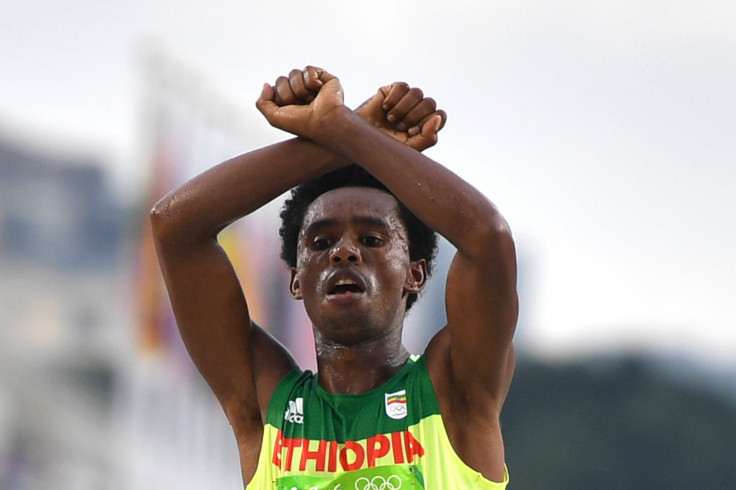Olympics runner Feyisa Lilesa fails to return to Ethiopia after anti-government protest
Athlete says he fears for his life over Oromo people protest and is expected to seek asylum in the US.
Olympics silver medal winner Feyisa Lilesa has failed to return to Ethiopia after he staged a protest against alleged human rights abuses committed by his government. The runner crossed his arms over his head, a symbol of resistance common among Oromo people, Ethiopia's largest ethnic group, after he crossed the finish line of the men's marathon in Rio de Janeiro on Sunday (21 August).
Other Ethiopian athletes returned to their country, but Lilesa claimed he was fearing for his life. He is expected to seek asylum in the US.
Ethiopian sports officials congratulated Lilesa's team members when they landed at the airport in the capital, Addis Ababa, but made no mention of Lilesa and refused to answer questions regarding the athlete, AFP news agency reports.
The Ethiopian government claimed it will treat Lilesa as a hero upon his return to his homeland.
Meanwhile, Lilesa's supporters set up a crowdfunding campaign to support him seeking asylum. The organisers have managed to raise more than $119,000 in two days.
Protests in Oromia
Earlier in August anti-government demonstrations in Oromia led to the death of at least 67 people, according to opposition members and Amnesty International.
The demonstrations were the culmination of a wave of unrest that has rocked Oromia in recent months.
Protesters first took to the streets in November 2015 to voice their dissent against a government draft plan that aimed to expand the boundaries of the capital Addis Ababa.
They argued the so-called "Addis Ababa master plan" would lead to forced evictions of Oromo farmers who will lose their land and would undermine the survival of the Oromo culture and language.

Who are the Oromo people, Ethiopia's largest ethnic group?
Who are the Amhara people involved in Ethiopia's anti-government protests?
The Ethiopian government scrapped the master plan following increasing agitation which activists claimed led to the death of at least 400 people.
People are now calling for self-rule, the liberation of political prisoners, the end of what they perceive as "military regime" in the region. This includes the cessation of an alleged crackdown by security forces on "peaceful and unarmed" demonstrators, mainly students and farmers.
Authorities blamed foreign enemies for the unrest and deemed the recent protests as illegal.
© Copyright IBTimes 2025. All rights reserved.






















